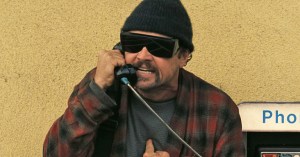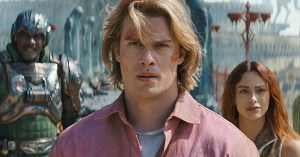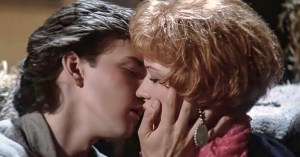Jessica Alba on The Eye: The RT Interview
And guess what, fellas? She's a science nerd, too!

It’s hard to believe it’s been only six years since Jessica Alba captured fan boy hearts the world over as Max, the genetically-engineered, super-sexy super-soldier star of James Cameron’s Dark Angel series. Fast forward to 2008 and the 26-year-old has the Hollywood game down pat, top lining films like Good Luck Chuck, two Fantastic Four films, and this week’s horror film, The Eye.
But while the remake of the Pang brothers’ original film is indeed Alba’s first foray into the world of horror, she’s been careful to avoid the trappings of exploitation cinema that the genre has trended toward in recent years. Instead of torture victims, Alba’s character Sydney Wells encounters tortured souls — souls who she can see, a la The Sixth Sense, after inheriting a pair of corneas from a supernaturally-gifted donor. Adding more texture is the fact that Alba’s character is a blind violinist, two additional challenges to the actress, who learned to live without sight and perform like a concert soloist for the role.
We spoke with AskMen’s No. 1 Most Desirable Woman about her role and how she chose The Eye as her first psychological thriller, about her violin skills and the humbling experience of researching her role with real-life corneal transplant patients. And while the expectant mother admitted she had “pregnancy brain” talking to the press, she let us know that she is, and always has been, a die hard science nerd. We see a Scientific American’s Most Sexiest Woman Alive Award on the horizon.
Can you describe your character for people who haven’t seen the movie?
Jessica Alba: I play Sydney Wells; she’s a blind classical violinist, she’s a soloist, and she has a corneal transplant and gains her sight, and when she gains her sight she also takes on the memories and abilities of the woman whose eyes she got. So she ends up seeing people who are dead, and also she’s psychic and can kind of see the future — more tragic things, not really positive, great things. So she’s sort of plagued with this ability, or horrible thing, and she feels like she’s losing her mind because she can’t really touch base with what’s real and what’s not. And also, she’s seeing for the first time so it’s hard for her to get a grip on it.
What attracted you to the project?
JA: The fact that I got to play somebody who was blind, and a violin player — it was pretty complex, for a horror movie. I liked the fact that it was a psychological thriller, and not necessarily a gore-fest. It wasn’t really about someone being tortured, it was about someone losing their sanity and trying to get it back. I thought the story was pretty interesting, and layered, and the relationships that she had with her sister, and her doctor, Alessandro [Nivola]‘s character, were pretty unconventional.

Did you actually spend time with blind people, to research the character?
JA: It was pretty intense. I spent time at two blind orientation centers, one in L.A. and one in New Mexico. The one in New Mexico I was with about twelve other students that were fairly young, late teens early twenties, some of them were parents, some of them were just kids, who either had immediately become blind from an accident, and others were slowly becoming blind. They were all trying to learn how to deal with the blindness; I was an actress coming in, they had no idea who I was, they just thought I was another student. You know, I can take my mask off and walk away, and they couldn’t…so that was kind of difficult to deal with, and quite humbling. But I learned how to read Braille, I learned how to walk with a cane, I learned how to get around, label my clothes, label things in the house from the stove to the microwave to the sink, hot cold, you label absolutely everything in the house.
Did you meet with anyone who regained their eyesight and explained what it was like for them to take in the world for the first time?
JA: I did meet a few people who had had corneal transplants; one who’d gained his eyesight and then lost it again, and someone else who had a degenerative disease, and was losing [her eyesight] and had a corneal transplant and got it completely. The guy who wrote the script — it’s pretty true how disorienting and difficult it is to take in everything at once, everything brand new. It really plays tricks on your mind and your perception of things is…so altered, when you bring in this element that you just aren’t used to.
Had you seen the original movie?
JA: Yes, of course. I enjoyed the original, and I really enjoyed the main character’s stoic performance. I thought it was very subtle and quiet, and quite elegant. In Eastern culture, ghosts and mysticism and spirits are part of culture and more accepted, and in Western culture it’s just not. People think you’re insane if you believe in ghosts, and it’s just completely unacceptable to say that you’re seeing stuff. And so we took a more Western approach because, obviously, we’re doing a Western version of it.
What was your biggest challenge in playing someone who’s blind?
JA: Becoming sighted, and playing the violin blind was tough. Because I did so much training on that violin, and not being able to look at the notes while I was playing them and having to just know them by feeling…ah, that was impossible!

Did you really play it?
JA: Yeah, I did. I mean I had to; they said in post they just had someone come in and play all the notes that I was playing to make it sound nicer, because [I sounded] really bad. Like, very screechy and very high pitched and bizarre. But the notes were there. I played the notes and I played the rhythm, it just sounded…really bad.
How long did you have to train, with the violin and the Braille?
JA: About four and a half months, but I was shooting another movie. So I had Fantastic Four, and then I had Christmas break, and over Christmas break I kind of really got into it.
Had you seen the directors’ [David Moreau and Xavier Palud] horror film, Ils?
JA: Yeah. That was why we hired them; the fact that they did a whole movie with virtually no dialogue that was very scary, and thrilling. You’re going on this journey with these two people who are being chased in a house. It was so inexpensive, and they made it really entertaining. We wanted them to bring that element to this movie; we had the complicated character, we had the plot twists, and we really needed them to infuse the scary into the film.
What are some of your favorite scary movies?
JA: Well I do like Nightmare on Elm Street, the first one. I like Psycho, Poltergeist, The Birds, It, Rosemary’s Baby…kind of more like ghosts and demons, and stuff like that, less like a psychopath coming to rip your body apart.

You went from playing a superheroine in Fantastic Four to playing this girl that sort of gets super powers. Do you see Sydney as a kind of superhero?
JA: I don’t know if they’re superpowers; they’re more like horrible powers! But no, I don’t really think of her as a superhero. It is kind of empowering, to play somebody who is strong, and cool, and kick ass, because usually it’s the guys that play those roles. So yeah, it’s nice.
Have you been approached for other superhero roles, and would you do them?
JA: A few. I love doing Sue Storm, so I don’t know if I really want to repeat and do something else.
You’re coming back for the new Sin City, right?
JA: Whenever that happens. I haven’t seen a script, and they haven’t given me a date or anything.
This is a PG-13 film, and a lot of young girls will be going to see you in this movie. Is there some sort of message you’d want young women who look up to you to take away from this film?
JA: I think there’s something quite empowering about just watching a fairly young person starring in a movie, and in a horror movie that isn’t exploitative. It’s very entertaining, and my character’s quite strong and independent. She’s seeking a truth, that everyone thinks she’s nuts and that she’s losing her mind but she’s true to herself in finding her sanity. And I think you can look into it, or not look into it, but in the most broad terms I think just seeing a young person starring in a movie that isn’t exploitative is pretty different, and cool.

This isn’t a gory horror movie, like a lot of horror movies these days are. Was that something you really wanted to avoid?
JA: I didn’t really feel like playing someone who was tortured, or mutilated, or anything. I think there’s enough of that. To me it’s much more interesting to watch what’s going on in someone’s head, and is it real or is it not? The psychological aspect is much more intriguing to me.
At this point in your career, are you at a place where you can pick very specifically what you do and do not want to do in movies?
JA: Yeah. Totally.
Are you a believer in the supernatural?
JA: I’m not closed off to it. I think nothing’s happened in this world, and certainly to people in my life that I know, that are unexplained things. I don’t know – I can’t really be totally shut off to it.
Have you seen The Eye with an audience yet?
JA: I haven’t. I haven’t seen the complete cut, so the premiere will be the first time. I hope it’s scary!

Latin American countries are known for being very superstitious, spiritual. Did you grow up with anything like that?
JA: My grandmother definitely believes in a lot of mystical things, good luck things. We had a woman who was sort of the family psychic, more of like a spiritual guide, and she would come in and read our palms. I wouldn’t understand what she was saying, so my grandmother would tell us and interpret it. It was always really emotional; she wasn’t somebody who did it for money, it was just her gift.
There’s a line in the film suggesting your character’s procedure is tied to stem cell research. Do you see The Eye as a pro stem cell research movie, or was that just a throwaway line?
JA: I don’t know if it’s a pro stem cell research movie, although I did read recently that they can take stem cells from embryos without killing the embryo. They just learned how to do it and they’re trying to get the government to pass it, I think I read about it last week.
[As far as the movie] it wasn’t discussed, but I’m kind of into it. I think it’s amazing if we can somehow do it without having to damage the embryo. It would be a dream come true, and science has been able to do that.
Have you recently become more interested in reading about science because of your pregnancy?
JA: No, I’ve always been into it. That was kind of my favorite subject in school. Nanotechnology is really interesting to me. Stuff to sort of make our world a better place, and a cleaner place, through science. And it also explains things that are happening. I’ve always been into it.
That will make a lot of science nerds happy to hear.
JA: Yeah. I like science!
Congratulations on the pregnancy – how have things changed for you?
JA: I can’t really push myself as hard at the gym, but I do work out, because I read in all the books it’s good to work out. You’re basically preparing for a marathon, going through childbirth. So you have to keep your body prepped for that. I’m trying to eat right, knowing that everything I put into my body affects my baby. It’s really exciting!
The Eye hits theaters this Friday.






